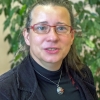Professor Agnieszka Pollo has taken the position of Deputy Director for Science at NCBJ
2023.10.16 22:58 - Marek PawłowskiOn October 16, 2023, a change took place in the position of Deputy Director for Science at NCBJ. The former director, Professor Ewa Rondio, passed on her duties to Professor Agnieszka Pollo, an astrophysicist who has been successfully leading the rapidly developing Department of Astrophysics.
Prof. Agnieszka Pollo is an astrophysicist who focuses on research in observational cosmology, large-scale structure statistics of the Universe, galaxy evolution, multidimensional data analysis, and astroinformatics.
Agnieszka Pollo completed her master's studies at the Faculty of Physics, University of Warsaw. She obtained her Ph.D. in physics at the Nicolaus Copernicus Astronomical Center in Warsaw in 2000, and habilitation in physics at the Jagiellonian University in 2011. She was awarded the title of professor of physical sciences in 2021.
From 2008 to 2011, Agnieszka Pollo served as deputy head, and then from 2012 to 2014, she was the head of the Independent Laboratory of Astrophysical Instruments at the National Centre for Nuclear Research. She has been leading the Astrophysics Division of NCBJ since 2014. Since 2012, she has been a professor at the NCBJ. From 2009 to 2019, she was also an assistant professor at the Astronomical Observatory of the Jagiellonian University, and since 2019, she has been a professor at this university. Since October 16, 2023, she has held the NCBJ Deputy Director for Science position.
Prof. Pollo actively collaborates with scientists from various locations worldwide. She was a member of the steering committee of the VIPERS project. She coordinates the Polish consortium for the LSST project, and co-leads the consortium of the POLAR-2 space project. Presently, she is a member of the Astronomical Committee of the Polish Academy of Sciences, and she represents Poland in the Users Committee of the European Southern Observatory.
The research activities of Professor Pollo and the scientific teams she leads in the field of observational cosmology contribute to a better understanding of the Universe and its evolution.


















